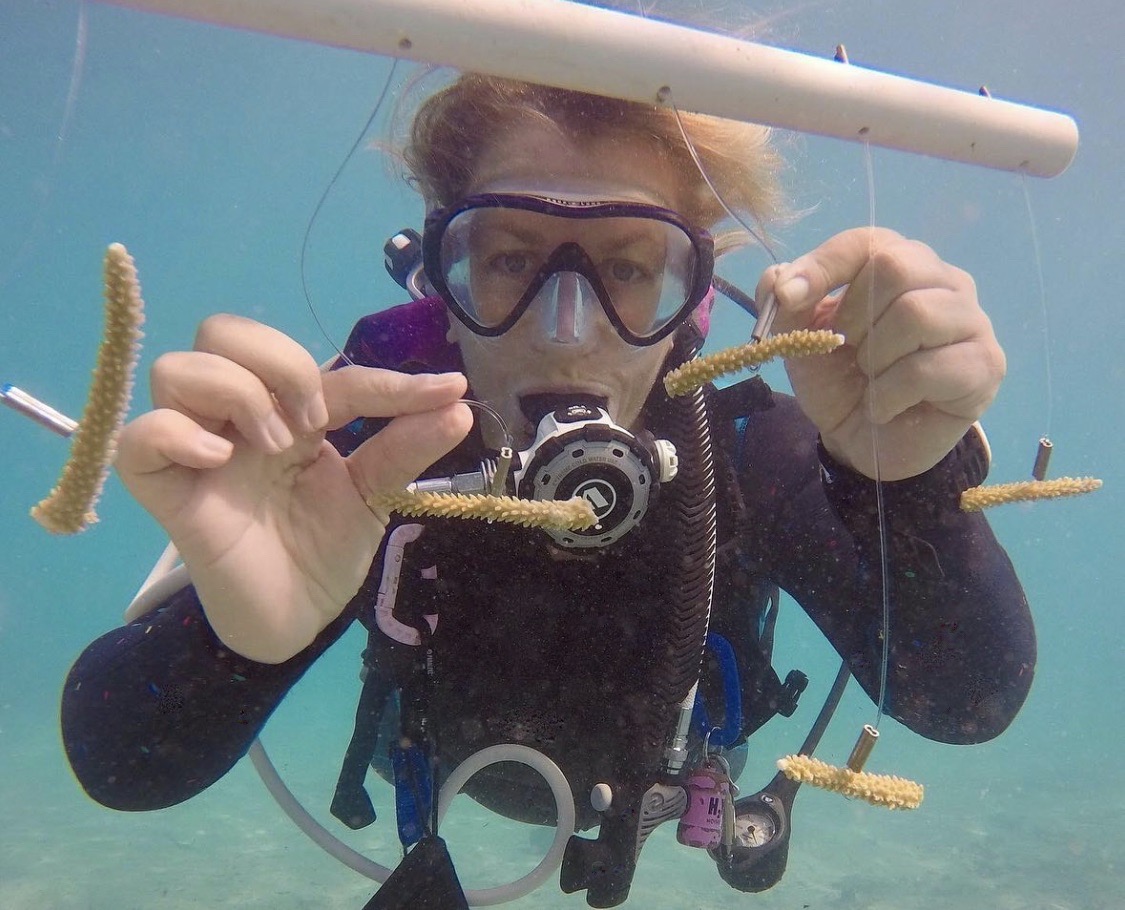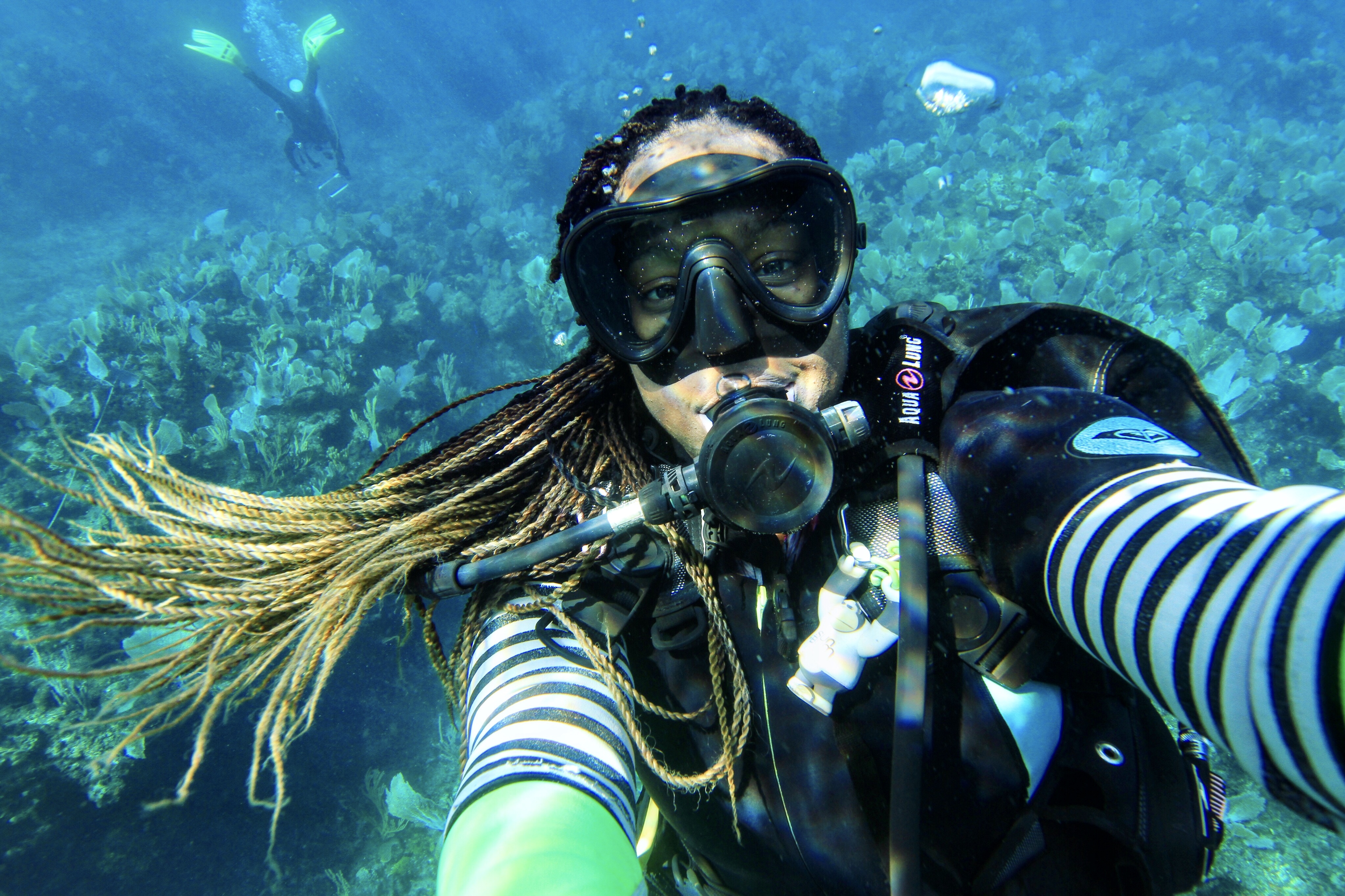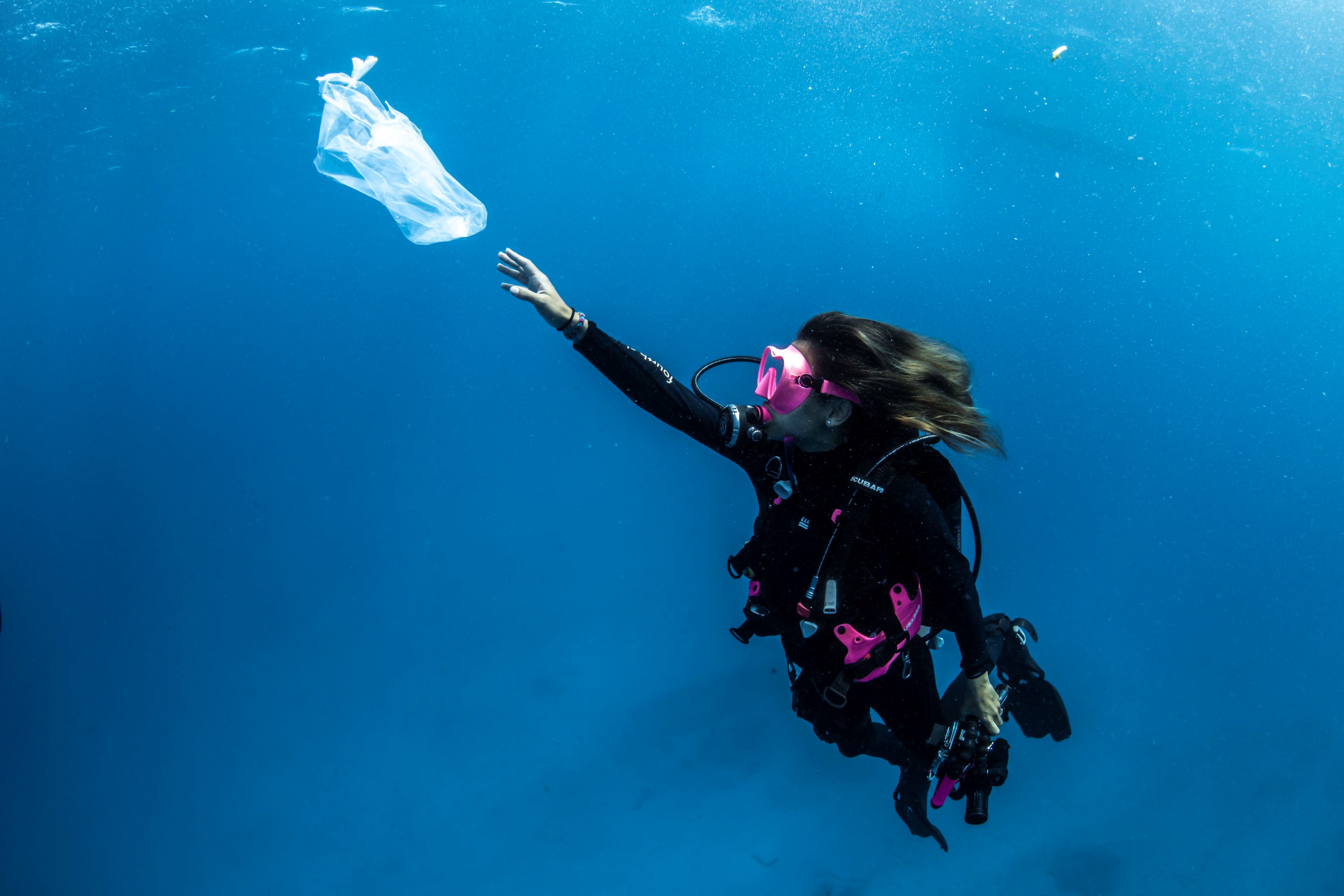Women Taking Action for Ocean Conservation
Interviews with leading female divers inspiring local communities
On World Environment Day, inspired by the video The Ugly Journey of our Trash, a team of female divers from many countries of the world launched a video on social media, where they passed plastic items we use in our daily life to one another to show the amount of plastic packaging that ends up in the landfills and eventually in our ocean to educate on the danger of plastic in our oceans.
We have talked to some of the divers featured in this video and asked how they advocate for the ocean as female role-models in their local communities.
Fernanda Paiva Let's Dive, Brazil
1. How did you come up with the video idea and why was it important to you to get involved?
Two friends of mine, Mojan and Mayen, had the idea to create a support video for this hard time of the coronavirus pandemic with scuba girls around the world. The main objective was to show that we are all together during the hard times of the coronavirus pandemic. Initially the idea was to throw hand sanitizers around the world. This time I realized that we could go further and address the problem of plastic in our daily lives, and I was inspired by the video The Ugly Journey of our Trash! Then came to me the idea to show the amount of plastic packaging that ends up in the trash and hence the importance of making better choices at the time of the purchase.
2. What does ocean conservation mean to you?
Ocean conservation for me is a change in our behavior, since it begins in our daily lives. We need to think about conserving the oceans when we go to the supermarket, when we choose a product, when we choose a company to work with. For me, ocean conservation is a new lifestyle, where we prioritize the preservation of our planet and make choices based on that.
3. What are the actions you take personally or in your dive centre to be a torchbearer for ocean protection?
We frequently organize Dive Against Debris® and we also adopted the dive site we most visit here in Maceió. In addition, we use our social media to educate our followers about ocean conservation and I love to teach Project AWARE® courses. They are great tools to increase knowledge and to show how people can help preserve ocean conservation.
4. How do you find being a woman in the ocean conservation world/diving industry?
As a diver and a diving instructor, unfortunately I can see the impacts of humankind actions and I feel responsible for educating and making people aware of the importance of ocean conservation. I have a motto: we only preserve what we love and we only love what we know. It's much easier for someone who dives, who has seen the underwater beauties with their own eyes and lived the experience of diving really engaging in ocean conservation. We are still a minority in diving, but the number of women is increasing in the diving industry. I feel privileged to be a woman and to be able to use my work to contribute to the conservation of the oceans.
5. What is your message to inspire non-divers and the new generation to create long-lasting change for the health of our ocean?
As I said, in my opinion we urgently need to change our behavior as human beings. In the last decades, the world was focused on increasing production, reducing costs and increasing practicality on a daily basis, but at no time did we think about natural resources and the generation of waste, such as plastic. So this is a time to take a step back to review our consumption pattern and we need the help of everyone, divers and non-divers, especially the new generation.
Hayley-Jo Carr The Perry Institute for Marine Science, The Bahamas

1. How did you come up with the video idea and why was it important to you to get involved?
Mojan Movahedi contacted me about joining to create the video and as female scuba divers from all over the world we all chatted about how each of us regularly removes debris while diving so we really wanted to send the message that it’s important to dispose of your trash properly and make better decisions in your home to stop it entering the ocean in the first place. We were all stuck at home during the pandemic, so we had the chance to be fun and creative with the message and it was a great way to connect with other female divers from different countries during lockdown.
2. What does ocean conservation mean to you?
Ocean conservation is not only about conserving what we have but helping to restore and rehabilitate the ocean and its marine life. We are losing so much in terms of biodiversity with many animals listed as endangered that it is vital we all play our part in restoring, protecting, educating and immediately taking action.
3. What are the actions you take personally or in your dive centre to be a torchbearer for ocean protection?
The Perry Institute for Marine Science created the Reef Rescue Network which is a network committed to improving the condition of coral reefs by restoring populations of corals and other species that will build coral reef resilience. We are growing critically endangered corals and then outplanting them back onto reefs to help bolster the existing coral population and create vital habitat for marine life. I have created a PADI Distinctive Specialty, Reef Rescue Diver, to allow recreational divers to become actively involved with coral restoration to help protect coral reefs and its inhabitants.
4. How do you find being a woman in the ocean conservation world/diving industry?
As a PADI Course Director and Marine Conservationist I am actively involved in both industries and understand they are still very male dominated. My experience, however, is one being surrounded by incredible female scientists, researchers, campaigners, educators, dive instructors, divers and managers and I am so proud to see the work these women are doing. It is up to us to continue to inspire and educate the next generation of women to follow careers in the marine environment and change this gender inequality for the future.
5. What is your message to inspire non-divers and the new generation to create long-lasting change for the health of our ocean?
Our own futures depend on a healthy ocean and planet, we can no longer allow it to be abused and ignored. So much damage has been done, however, it is never too late to make a change and take action to stop further decline and to assist in its recovery. Every single one of us can make a difference no matter how small, you must start to take action now. The ocean gives humankind so much, it’s now time to show some love back!
Katie Storr San Salvador, the Bahamas

1. How did you come up with the video idea and why was it important to you to get involved?
I was invited to the project by Hayley Jo Carr, she is my PADI Course Director and friend. Being a part of this project was a great way to spread an awesome message on keeping our oceans clean. It was innovative and lots of fun creating a unique way to capture our audience while keeping trendy. Social media trends are constantly growing and it is important as educators and mentors for us to evolve with our growing market.
2. What does ocean conservation mean to you?
My country depends on the ocean to survive, with our main industry being tourism. The ocean provides jobs for thousands of people within the Bahamas. Most importantly, a lot of the outer island communities thrive from sustainable lifestyles, depending on the ocean for food to eat locally and tourism consumption. Our economy's survival depends heavily on healthy ocean ecosystems.
3. What are the actions you take personally or in your dive centre to be a torchbearer for ocean protection?
Becoming a Reef Rescue Network Diver Instructor and AWARE Shark Conservation Instructor through continuous education. I now see the ocean in a different way, I have learned why diving for a purpose matters and I am able to shape and mold my students into becoming better stewards and advocates for the ocean. Being able to teach them about coral reefs and sharks and why these animals play such a huge role in healthy ecosystems changes the way they view and interact when in the ocean.
4. How do you find being a woman in the ocean conservation world/diving industry?
It is extremely challenging, however, platforms like PADI are showcasing women in the dive industry. Women don't get enough credit where it is due, we are represented in underwater photography, marine sciences, we are doctors and also commercial divers. Being a minority requires us to be innovative and ready for whatever comes our way, but times are changing and women scuba professionals are being placed in the spotlight. This is truly inspiring!
5. What is your message to inspire non-divers and the new generation to create long-lasting change for the health of our ocean?
It would have to be my favorite quote:
Even if you never have the chance to see or touch the ocean, it touches you with every breath you take, every drop of water you drink, every bite you consume. Everyone, everywhere is inextricably connected to and utterly dependent upon the existence of the sea.
- Sylvia Earle
Sarah Gauthier aka Scuba.Sarah, Canadian living in Germany

2. What does ocean conservation mean to you?
Ocean conservation is really important to me. Primary because the ocean produces most of the oxygen on our planet! But also because many creatures depend and live in it. Like all ocean lovers, I really enjoy admiring the underwater fauna and flora and that’s why I want to protect it.
3. What are the actions you take personally or in your dive centre to be a torchbearer for ocean protection?
Being a torch bearer can be done in so many ways, I think that leading by example and always trying to improve are two important things. Practically, I try to reduce my general consumption, avoid eating fish and ocean products, lower my plastic use and clean the ocean/beach every time I have the chance.
4. How do you find being a woman in the ocean conservation world/diving industry?
There are so many passionate people, men and women, in the conservation industry. However, seeing other strong women leading projects and having an impact inspires me a lot. It gives me a feeling of being part of a community and pushes me to do better.
5. What is your message to inspire non-divers and the new generation to create long-lasting change for the health of our ocean?
Try to reduce, reuse, and start by doing little changes that will stay forever more than crazy changes that will last a little while and won’t stick around. Also, remember that nobody is perfect but a big group of people that start to do little changes will eventually have a really big impact. Don’t feel that what you do has no impact because it is not true!
Mojan Movahedi Shark Diving School, Iran
1. How did you come up with the video idea and why was it important to you to get involved?
I was planning for a Dive Against Debris and beach clean-up for World Environment Day 2020, and then COVID-19 hit, forcing us to stay home and giving the oceans a chance to heal naturally. My wish is for this to continue. Since plastic pollution is a global issue and protecting the oceans starts from our home, I wanted to show how we can play our part through simple recycling, so I thought that having the message delivered by female scuba divers from around the world would make a strong statement. I started reaching out, we brainstormed together, and that's how this amazing collaboration started.
2. What does ocean conservation mean to you?
We all need air to breathe, water to drink, food to eat and a climate we can live in. Whether diving or just walking along the shoreline, we all can appreciate the beauty, inspiration and recreation of the oceans. Plastic pollution and environmental degradation are nothing but the consequences of our doing. The pulse of the Earth is in our hands. We are responsible for the future of our loved ones, the next generation and the life of every single living species on this planet. The ocean is a reminder that despite our differences, we are all connected, and we must work together to preserve its nature. Our survival depends on it.
3. What are the actions you take personally or in your dive centre to be a torchbearer for ocean protection?
I became a vegetarian because I wanted to align my diet with my beliefs and help protect vital oceanic ecosystems that are so crucial to future generations of all species. I drink on average 2 litres of water every day, so, installing a water filtration faucet at home has helped me save about 500 plastic mineral water bottles per year. I use plastic-free alternatives and never forget to take my fabric reusable bags when I go shopping. At the dive centre, we run regular Dive Against Debris events, as well as shoreline clean-up activities. And on the rare occasion that I see fellow divers touching marine life, I always discourage and warn them about the irreparable damages they can cause to our marine life.
4. How do you find being a woman in the ocean conservation world/diving industry?
Seeing other women emerge through the barrier of sexism in the male-dominated industry is something that continually inspires me to push for my place next to the women I look up to. Of course, women can scuba too, and I hope my success would encourage more women to enter this sport, especially the women of my country. Women have always been instrumental in the education and upbringing of our children, and I’m sure by educating ourselves about culture and environment preservation, we can play a crucial role in educating younger generations about healthy consumption patterns and protecting the environment.
5. What is your message to inspire non-divers and the new generation to create long-lasting change for the health of our ocean?
Become an advocate of the ocean: “Build ocean knowledge!”, educate yourself about the ocean and marine life because you cannot protect and preserve what you do not know! “Explore the ocean!”, observe its beauty and learn about the reefs, the most diverse ecosystem in the world which are on the verge of collapsing. “Raise awareness!”, use your voice to shine a spotlight to stop the urgent crisis in our ocean. “Help take care of our beaches!”, respect the marine environment, always clean up after yourself and participate in local beach cleanups. “Avoid seafood”! or if you can’t, then make responsible, sustainable choices. “Use fewer plastic products and refuse excess packaging”. “Vote on ocean issues”. “Donate!”, by donating, you make an extraordinary contribution to the survival of our ocean giants. Make sustainability a lifestyle and a priority. Now is the time!



